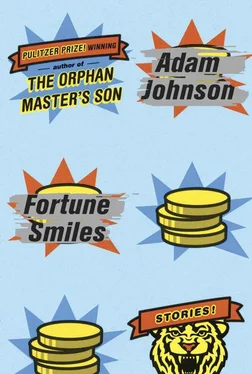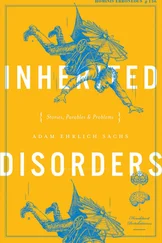Mina shook her head. “See why I thought he was your father?”
Sun-ho said, “Oh yes, it’s easy to make fun of old Sun-ho — until the day you need him. Do you remember that day, DJ? The day you needed me?”
With a right turn, Sun-ho joined a proper traffic flow onto a northbound highway ramp.
“I don’t forget,” DJ said.
“What day is this?” Mina asked.
“Oh, this is a very entertaining story,” Sun-ho said. “DJ tells it best, don’t you, DJ?”
DJ threw Mina a look.
“Go on,” she said.
“The story starts with a man named Jong-il,” DJ said.
“I have never met this Jong-il, by the way,” Sun-ho said. “If he exists.”
“Jong-il and I went to engineering school together,” DJ continued. “Jong-il’s father was very cunning. He named his son after Kim Il-sung’s son because no one could ever give offense to someone who shared the Dear Leader’s name. Jong-il was smart, and the two of us were very competitive. One week I was the top student. The next it was Jong-il. We fought constantly for the top spot, always trying to outdo each other. But there was respect, too. If I discovered there would be a surprise exam, I would tell Jong-il, and he would do the same. In the end, I finished number one.”
“Sounds like this story will have a happy ending,” Sun-ho said. “I bet everything’s going to work out just fine.”
“So Jong-il ends up in Wonsan, making fake pharmaceuticals. The pill part is simple — they simply use laxative powders, which machines then shape and color. He shares his labs with Man-seok, also from our school, who makes real drugs, like ecstasy. The key to faking medicine is the packaging, so Jong-il uses my press to make four-color labels and blister foils.”
“Your press?” Mina asked.
“Long story,” DJ said. “One day Jong-il calls me. He says there’s been a mistake. He says there was a mix-up, that some bad medicine went to Pyongyang rather than China, and people in the capital are sick. He says that heads are rolling and Man-seok’s team is gone. He says trucks have come for him; they’re pulling up out front. ‘Run,’ Jong-il tells me. Then the call is over.”
“Does Dongjoo inform me of this?” Sun-ho asks Mina. “Of course not. He comes to me and says to cut the power, send everyone home, grab all the lottery tickets and bring the car around. Dongjoo, he knows design and accounting and specs and all that. I know people. That’s what I deal with. I know when someone’s lying. I would have known right away this was a trick — first there is a mess-up in production and then also a mess-up in shipping? These are people who don’t mess up. Who gets our operation when we suddenly defect? Jong-il does, that’s who.”
“Mess-ups happen,” DJ said. “We made them. What about the Lexus train? What about Mahjong Madness? Did you forget burning those ten thousand tickets?”
Sun-ho says, “So we’re driving north for the border, just like we are now. ‘Faster’ is all Dongjoo will say. He tells me nothing.”
“So much was in my mind,” DJ said. “My parents, the workers, their families. The idea of running was a strange dream — possible and impossible at the same time. It was only when we neared the border that it became real. It was only then that I thought about Sun-ho and how I couldn’t leave him behind.”
“Admit the truth,” Sun-ho said. “You were thinking, Sun-ho knows the border guards, he crosses all the time . While you yourself have never crossed.”
“I was thinking how ugly it would be that after years of friendship, I would go free and you would not.”
“You had never seen the outside world. You didn’t know a single person in China. You didn’t know the first thing about the real world. You were afraid.”
“I was afraid they would kill you.”
For a moment, Sun-ho simply drove. The only sounds were balloons mobbing one another in the windy backseat.
“So he doesn’t inform me that we’re defecting. Can you believe that? I had no idea I was leaving home forever. I don’t get to say goodbye to anyone, I don’t get to see Willow or even hear her voice one last time.”
“Who’s Willow?” Mina asked.
Sun-ho said, “Why don’t you tell Mina what you told the border guard?”
“That was a mistake,” DJ said. “I never denied that.”
“We’re at the bridge,” Sun-ho told Mina. “On the other side is China. I cross once a month to deliver lottery tickets and to sign for car shipments. So I’m passing cigarettes all around, just like normal, when Dongjoo rolls down the back window and says, ‘We’ll never see you again.’ To the border guard. The guard says, ‘What?’ Dongjoo says, ‘And you’re going to die here.’ The guard gets this serious look on his face, and when he places a hand on that holster, I step on the gas. That’s why I couldn’t just drop Dongjoo off in China and hand out some more cigarettes on my return.”
“I said it in a sad way,” DJ said. “I was thinking, I’ll never see these hills again, I’ll never see Chongjin again, I’ll never see my folks . And that guard, he was just a boy, he couldn’t have been nineteen. I said exactly what I was thinking, that we were leaving and that every one of them would die there.”
“What happened?” Mina asked.
“What happened?” Sun-ho barked. “This happened. We’re stuck in South Korea!”
Mina flinched at his anger. “I mean, was it a trick? What happened to your business? Is Jong-il in charge?”
DJ stared through the window at the grey, blue-roofed suburbs. “We don’t know,” he said.
“I know,” Sun-ho said. Through his teeth, he said, “I know .”
—
Overcast skies hovered above the DMZ parking lot, with low grey clouds moving steadily north.
Sun-ho parked behind a row of tour buses. From the backseat, he wrestled a large array of silver Mylar balloons printed with many variations of Happy Birthday . Despite the cold, Sun-ho removed his new jacket and tied it on. “My mistake last time,” he said, “was launching from the border, where the guards patrol. This jacket has a long journey ahead, and an extra kilometer won’t make a difference.”
DJ watched the balloons twist in the wind, straining to deliver their lightweight cargo. He’d imagined the burger and now the jacket floating off to a field worker, but the wind was due north, a flight path taking it over Panmunjeom and Gaesong City on a vector to Pyongyang. In his imagination, the balloons were headed directly for his parents in Potonggang, and when the cargo got closer, when he imagined his folks on their balcony, arms open and facing south, when the bird’s-eye view was close enough to see their faces, their expressions, how they’d aged — there was nothing; his imagination simply turned off.
Mina pointed across the parking lot. “What’s going on over there?”
DJ turned to see. Past the buses was a group circled around several tall, clear balloons, each a couple stories high. Surrounding them were video cameras and a microphone on a pole.
“I bet it’s one of those celebrity defectors,” Sun-ho said. “With her big eyes and sad story, out to get famous by telling the world how victimized and pathetic we are.”
When they neared, though, they saw that the defector was a man, about DJ’s age and Sun-ho’s size. He wore a suit and a smile and a name tag that read Seo . He was directing the filling of balloons from brown cylinders, and the loading of baskets with thousands of flyers.
Seo approached Sun-ho and handed him a flyer. It read Kim Jong-un Is a War Criminal , followed by quotes from a UN report.
“You’re from the North, I can tell,” Seo said. “Come, help us spread the word.”
Читать дальше












